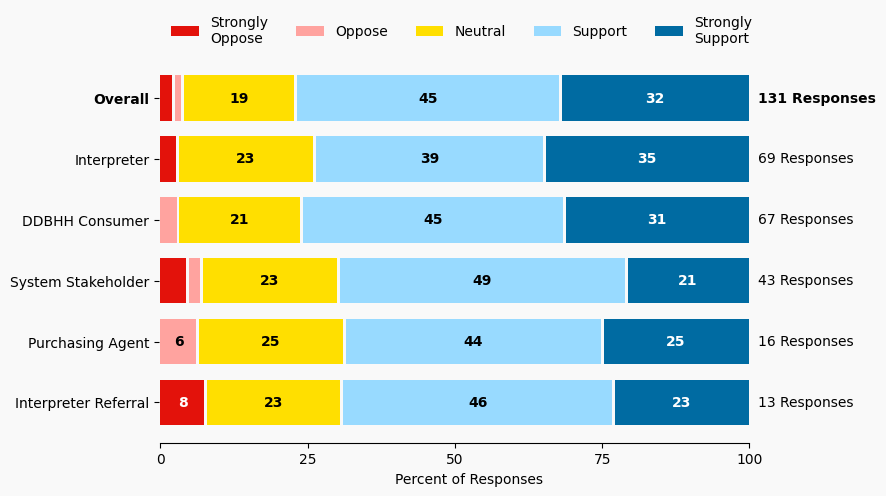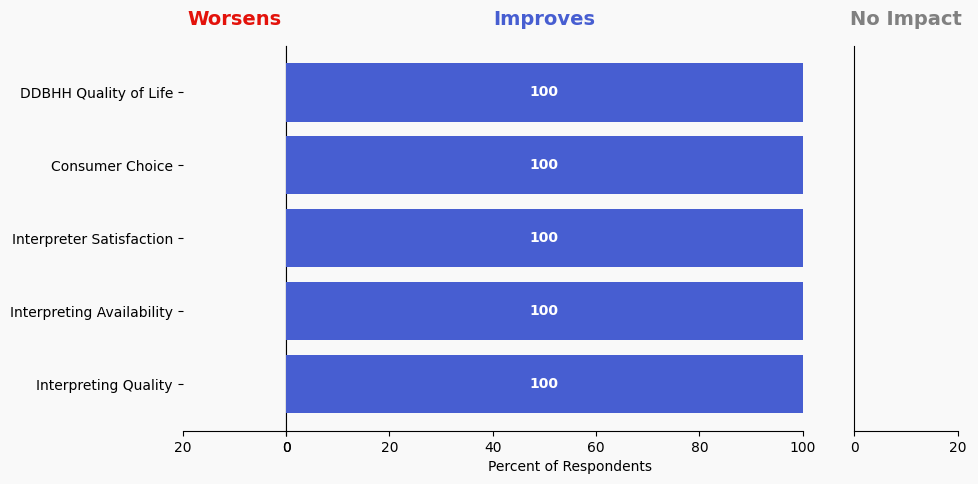23 Interpreter Referral Companies Host Community Conversations about Their Policies and Practices
Issue: Consumers and interpreters do not have clarity on interpreter referral companies’ policies, practices and standards. Multiple concerns were raised during community input sessions that appear to be attributable to interpreter referral company practices, including detrimental impacts to consumers due to competition among companies.
Proposed Solution: Interpreter referral companies host community conversations to share their policies, practices etc. Leave significant time for Q & A and have staff on hand to engage in private 1:1 conversations to review specific instances that community members raise.
Expected outcome: More transparency for consumers and interpreters about interpreter referral companies’ practices and policies. Consumers and interpreters can share feedback with companies for their consideration to shift policies and practices.
Who is impacted: Interpreter referral companies, consumers, interpreters
Timeline: 6 months
Note: The Twin Cities Freelance Interpreter group hosted a conversation with interpreter referral companies January 11, 2024. Interpreter referral companies could connect with TC Freelance group to get more information and considerations prior to hosting a community conversation.

Summary of Support Image Description
The stacked bar charts show how respondents rated their level of support and the total number of responses. The percentage for the five support levels is shown from left to right: Strongly Oppose (Dark Red), Oppose (Light Red), Neutral (Yellow), Support (Light Blue), and Strongly Support (Dark Blue).
Respondents may identify with multiple subgroups. The overall level of support is:
Overall
Strongly Oppose: 2%
Oppose: 2%
Neutral: 19%
Support: 45%
Strongly Support: 32%
Click to see the detailed image description for each subgroup.
Interpreter
Strongly Oppose: 3%
Oppose: 0%
Neutral: 23%
Support: 39%
Strongly Support: 35%
Interpreter Referral
Strongly Oppose: 8%
Oppose: 0%
Neutral: 23%
Support: 46%
Strongly Support: 23%
DDBHH Consumer
Strongly Oppose: 0%
Oppose: 3%
Neutral: 21%
Support: 45%
Strongly Support: 31%
Purchasing Agent
Strongly Oppose: 0%
Oppose: 6%
Neutral: 25%
Support: 44%
Strongly Support: 25%
System Stakeholder
Strongly Oppose: 5%
Oppose: 2%
Neutral: 23%
Support: 49%
Strongly Support: 21%
Overview of Respondents Opting for In-Depth Solution Analysis
After indicating their support level, 2% of the 131 respondents opted in to further assess whether the solution would worsen or improve on five metrics. Of the opt-in reviewers (3 respondents), 66% supported the solution, 33% were neutral on the solution, and 0% opposed the solution.
The remaining 128 respondents did not opt in to further assess the solution. Of these people, 77% support the solution, 18% were neutral on the solution, and 3% opposed the solution.
Reviewer Evaluation of Solution Effectiveness

Solution Effectiveness Image Description
The stacked bar charts show how respondents assessed the effectiveness of this solution based on five metrics. For each metric, the percentage of respondents is shown from left to right: Worsens (Red), Improves (Blue), No Impact (Gray).
DDBHH Quality of Life
Makes It Worse 0%
Makes It Better 100%
No Impact 0%
Interpreter Satisfaction
Makes It Worse 0%
Makes It Better 100%
No Impact 0%
Consumer Choice
Makes It Worse 0%
Makes It Better 100%
No Impact 0%
Interpreting Availability
Makes It Worse 0%
Makes It Better 100%
No Impact 0%
Interpreting Quality
Makes It Worse 0%
Makes It Better 100%
No Impact 0%
Reviewer Feedback and Insights
Interpreter
Comments from Interpreters suggest uncertainty about whether such meetings would bring communities closer together or create an adversarial relationship between agencies and the community. One comment suggests the need for accountability, inclusivity, and quality assurance to be addressed in these meetings. One comment expresses concern on whether these meetings would hurt or help the relationships between agencies and the community.
Deaf, DeafBlind, Hard of Hearing
Comments from DDBHH Consumers express uncertainty about how these meetings will look and whether they would ultimately help or hurt the community. One comment expresses concern on the potential impact on existing relationships and the effectiveness of such gatherings.
System Stakeholder
Comments from System stakeholders echo concerns about the structure and purpose of these meetings. One comment highlights the need for accountability, inclusivity, and quality assurance, but there is uncertainty about how beneficial these meetings will be.
PREVIOUS SOLUTION
22 Host DeafBlind & Interpreter Meet-and-Greet
Issue: DeafBlind consumers are not familiar with all working interpreters who are available and have some qualifications for working with DeafBlind individuals. DeafBlind consumers are not able to expand their interpreter preference list without knowing the interpreters and their skills.
NEXT SOLUTION
24 Host DDBHH & Interpreter Meet-and-Greet
Issue: Concerns have been raised about divisiveness in the interpreting and DDBHH communities. Interpreters and DDBHH community members do not have many opportunities to come together with a focus on getting to know each other to be better prepared to work together in different settings.
Leave a Reply